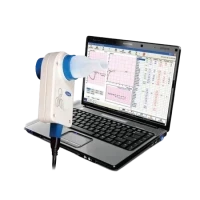
Medicaid Spiro Excel PFT Machine
The Medicaid Spiro Excel PFT (Pulmonary Function Test) Machine is a diagnostic device used to assess and measure lung function. It's utilized in various clinical settings to evaluate respiratory health, diagnose pulmonary conditions, and monitor lung function over time.
Key Features:
1. Comprehensive Spirometry Testing:
- Spirometry Measurements: Provides detailed spirometry tests to measure lung volumes, airflow, and capacity, including Forced Vital Capacity (FVC), Forced Expiratory Volume (FEV1), and Peak Expiratory Flow Rate (PEFR).
- Multiple Parameters: Capable of measuring various parameters essential for evaluating pulmonary function.
2. Advanced Technology:
- High Accuracy: Utilizes advanced technology to ensure precise and reliable measurements of lung function.
- Digital Display: Features a digital screen for real-time display of test results and data.
3. User-Friendly Interface:
- Touchscreen Controls: Often equipped with a touchscreen interface for easy operation and navigation.
- Intuitive Software: Provides user-friendly software for setting up tests, entering patient data, and reviewing results.
4. Data Management and Analysis:
- Data Storage: Capable of storing patient records and test results for future reference and comparison.
- Export Options: Allows for exporting data in various formats (e.g., PDF, CSV) for integration with electronic health records (EHR) or for further analysis.
5. Connectivity and Integration:
- Network Integration: Can be integrated with hospital or clinic networks for seamless data transfer and management.
- Printer Compatibility: Often compatible with external printers for generating hard-copy reports of test results.
6. Test Types and Capabilities:
- Pre- and Post-Bronchodilator Testing: Allows for both pre- and post-bronchodilator spirometry testing to assess the effect of bronchodilator medication on lung function.
- Flow-Volume Loops: Capable of generating flow-volume loops for detailed analysis of airway function.
7. Portability and Design:
- Compact Size: Designed to be compact and user-friendly, suitable for use in various clinical environments.
- Durability: Built to withstand regular use in busy healthcare settings.
8. Safety and Compliance:
- Regulatory Standards: Meets relevant medical device standards and regulations to ensure accuracy, safety, and reliability.
- Calibration: Includes features for routine calibration and maintenance to ensure consistent performance.
Applications:
- Pulmonary Diagnostics: Essential for diagnosing and managing respiratory conditions such as asthma, chronic obstructive pulmonary disease (COPD), and restrictive lung diseases.
- Pre-Operative Assessments: Used for pre-operative evaluations to assess lung function before surgeries.
- Routine Monitoring: Employed in routine check-ups to monitor lung health and track changes over time.
Benefits:
- Accurate Assessments: Provides detailed and precise measurements for accurate diagnosis and treatment planning.
- Efficiency: Streamlines the process of performing and interpreting pulmonary function tests.
- Versatility: Suitable for a wide range of diagnostic and monitoring applications in respiratory care.
